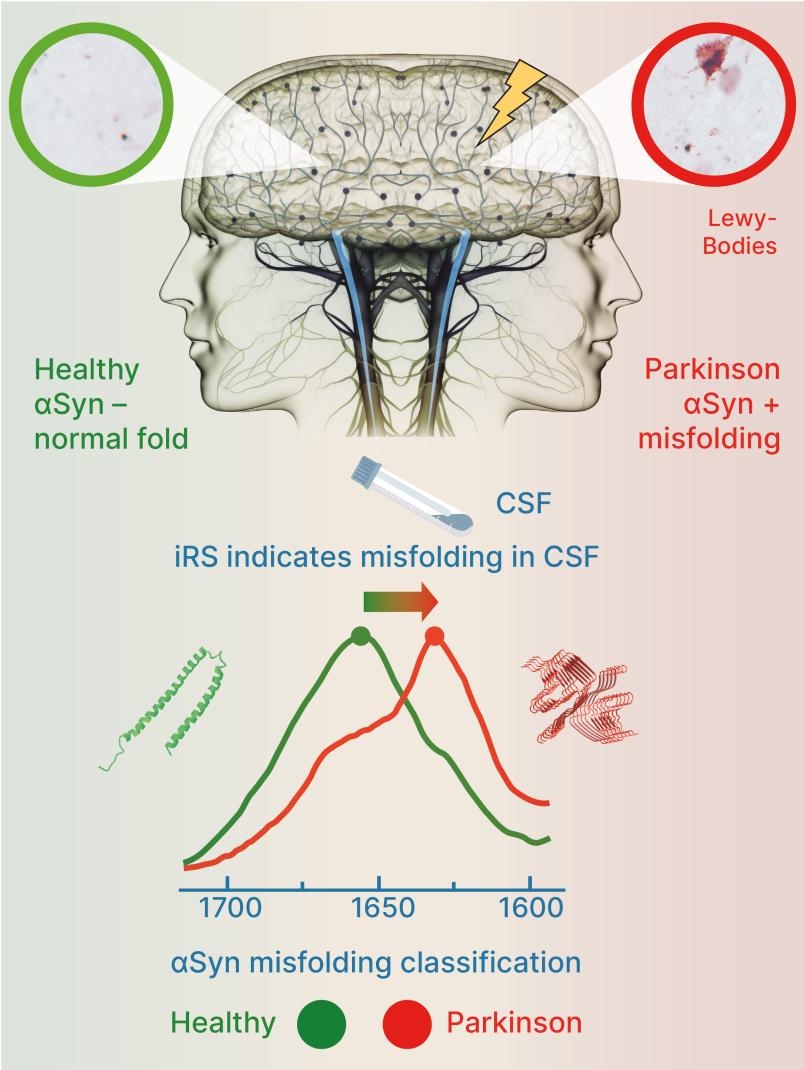
Klaus Gewert is founding and managing director at PRODI – Center for Protein Diagnostics at Ruhr University Bochum – and CEO of the company betaSENSE.
Biophysics
New Body-Fluid Biomarker for Parkinson’s Disease Discovered
A misfolded protein facilitates reliable diagnosis even in the early stages of Parkinson’s disease in body fluids.
Parkinson’s disease is a neurodegenerative disorder that is usually diagnosed in its late stage on the basis of clinical symptoms, mainly motor disorders. By this point, however, the brain is already severely and irreparably damaged. Moreover, diagnosis is difficult and often incorrect because the disease takes many forms and symptoms overlap with other disorders. Researchers from the PRODI Center for Protein Diagnostics at Ruhr University Bochum, Germany, and the biotech company betaSENSE have now discovered a biomarker in the spinal fluid that facilitates a reliable diagnosis at an early stage and can shed light on the progression of the disease and the effect of a therapy. They report their findings in the journal EMBO Molecular Medicine from April 25, 2025.
Parkinson’s disease – an unstoppable condition
Parkinson’s disease is characterized by the loss of dopaminergic nerve cells in the brain, which usually leads to increasing motor impairments as the symptoms progress. Dopamine supplements can compensate for the loss and temporarily alleviate the symptoms. The misfolding of the key protein alpha-synuclein (αSyn) from α-helical structures to β-sheet-rich structures plays a crucial role in the development of Parkinson’s disease. “These misfoldings make the protein sticky, leading to the formation of larger complexes, so-called oligomers. The oligomers then produce long fibrillar filaments and cause the aggregation of these filaments into macroscopically large Lewy bodies in the brain,” explains Professor Klaus Gerwert, founding and managing director at PRODI and CEO of betaSENSE.
Advanced platform technology
In two independent clinical cohorts with a total of 134 participants, the Bochum-based researchers showed that, with a sensitivity and specificity of well over 90 percent, this misfolding of αSyn in body-fluids is a viable biomarker for the diagnosis of Parkinson’s disease. The research was conducted using cerebrospinal fluid samples from patients at the Parkinson’s centers in Bochum (St. Josef Hospital, Professor Lars Tönges, Professor Ralf Gold) and Kassel (Paracelsus-Elena-Klinik, Dr. Sandrina Weber, Professor Brit Mollenhauer). The measurements were carried out using the patented iRS (immuno-infrared sensor) technology from betaSENSE GmbH.
betaSENSE has already successfully implemented the iRS technology for diagnosing Alzheimer’s disease. In this case, it was shown that the misfolding of the biomarker Aβ can indicate the risk of Alzheimer’s dementia at a later stage with high accuracy up to 17 years before clinical diagnosis. “We have now transferred this approach to Parkinson’s for the misfolding of αSyn,” stresses Klaus Gerwert.
Development of Parkinson’s drugs
In addition to diagnostic applications, the technology can also help to develop new active substances and prove their efficacy in clinical trials.

Hallmark of Parkinson’s disease are Lewy bodies in the brain consisting of misfolded alpha-synuclein proteins. These misfolded proteins can be measured by the iRS (immuno infrared sensor) technology of the company betaSENSE in body fluids like the cerebrospinal fluid. Bochum researchers showed that the misfolding of alpha-synuclein can precisely detect Parkinson’s disease in the cerebrospinal fluid (CSF). This allows a precise early diagnosis and early intervention, which improves therapy response.